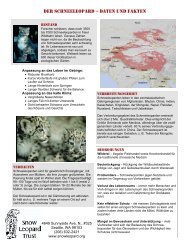Download the 7 Mb PDF file - Snow Leopard Trust
Download the 7 Mb PDF file - Snow Leopard Trust
Download the 7 Mb PDF file - Snow Leopard Trust
Create successful ePaper yourself
Turn your PDF publications into a flip-book with our unique Google optimized e-Paper software.
Engaging Students in Conservation<br />
34<br />
Vocabulary<br />
consensus—a state of agreement among<br />
multiple individuals or groups<br />
conservation—<strong>the</strong> act of protecting something,<br />
such as natural environments and wild<br />
species<br />
herder—a person who raises livestock, such<br />
as domesticated sheep and goats<br />
human-wildlife conflict—an interaction<br />
between wild animals and people when <strong>the</strong>ir<br />
populations overlap, which results in a negative<br />
impact on people or wild animals<br />
poacher—a person who illegally kills wildlife,<br />
usually for money<br />
poverty—<strong>the</strong> state of being poor and living<br />
without necessary resources<br />
Materials/Preparation—Days 1 and 2<br />
Handout: Rugged Realities, 1 per student<br />
(Optional) Handout: Town Hall Scenario, 1<br />
per student<br />
Handout: It Takes All Kinds of People, 1 for<br />
each group; 8 total<br />
Sheet of blank paper for group name/<br />
identity signs, 1 per group<br />
TERI AKIN<br />
It Takes All Kinds of People<br />
Activity—Day 1<br />
Introduction: Life among <strong>Snow</strong><br />
<strong>Leopard</strong>s (10-15 minutes)<br />
1. Ask students to brainstorm all <strong>the</strong><br />
different kinds of people that <strong>the</strong>y think<br />
are affected by snow leopards in some<br />
way.<br />
• (Optional) Save this list and refer to<br />
it at <strong>the</strong> close of <strong>the</strong> lesson, to measure<br />
and reflect on learning.<br />
2. Let students know that <strong>the</strong>y are about to<br />
learn a lot more about different kinds of<br />
people who interact with snow leopards.<br />
3. Ask <strong>the</strong>m what <strong>the</strong>y think <strong>the</strong> word<br />
conservation means. Review <strong>the</strong><br />
definition with <strong>the</strong>m. This lesson will<br />
focus on species (snow leopard) and<br />
ecosystem conservation.<br />
4. Explain to <strong>the</strong> class that <strong>the</strong>y are going to<br />
participate in a town hall meeting where<br />
<strong>the</strong>y will represent various groups whose<br />
lives are connected to or affected by snow<br />
leopards. A town hall meeting is a forum<br />
where citizens can voice <strong>the</strong>ir opinions.<br />
Attempting to reach consensus, or<br />
general agreement, will be especially<br />
important to this meeting, even though<br />
groups come from different backgrounds.<br />
5. To give students background information<br />
about <strong>the</strong> people who will be represented<br />
at <strong>the</strong> meeting, have students read <strong>the</strong><br />
handout Rugged Realities.<br />
© FACING THE FUTURE www.facing<strong>the</strong>future.org & SNOW LEOPARD TRUST www.snowleopard.org<br />
3




